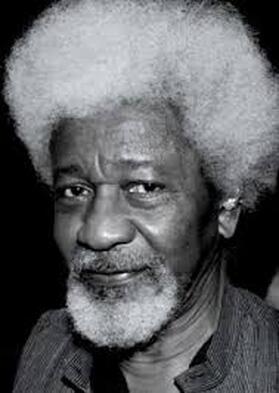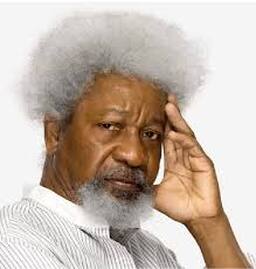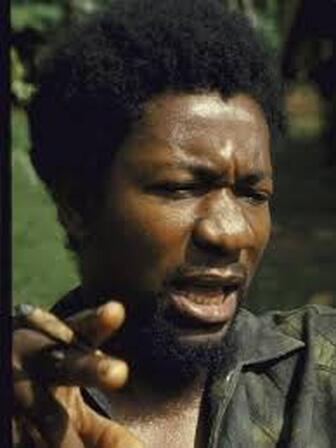|
On July 13, 1934, Akinwande Oluwole Babatunde Soyinka was born in Abeokuta, Ogun State, Nigeria, during the time the British controlled Nigeria. His parents were Samuel Ayodele Soyinka and Grace Eniola Soyinka. Samuel was an Anglican minister and headmaster of the St. Peters School, Grace was a Nigerian entrepreneur and political activist. Grace was also the cousin of legendary Nigerian singer Fela Kuti and Funmilayo Ransome-Kuti and was considered an important member of the Ransome-Kuti family. His family was Anglican but lived in an area where the Yoruba tradition was the dominant spiritual system. His early education included attending St. Peter’s Primary School, the Abeokuta Grammar School, and then he attended the Government College in 1946. As a student at Abeokuta Grammar School, Soyinka won several literary awards for his outstanding writing which would help to set the stage for his future as a writer. The Government College was considered one of Nigeria’s best secondary schools, he graduated in 1952 then went on to study English literature, Greek and Western History at the University College of Ibadan, which is connected to the University of London. Soyinka used his writing skills to create a radio play named Keffi’s Birthday Treat that was broadcast in 1954. That same year, Soyinka along with several colleagues created an anti-corruption student organization named Pyrates Confraternity. In 1954, Soyinka moved to London, England to further his collegiate studies at the University of Leeds, he also published several written works and begin writing a column for a magazine called The Eagle. He graduated from The University of Leeds in 1958 and remained in the city of Leeds to begin his career as a professional writer. His first pieces of work as a professional writer were the plays The Swamp Dwellers and The Lion and the Jewel. The plays were so good that they were performed throughout the UK and Nigeria. After moving to London, his next step was earning money as a play reader while he established himself as a writer. Two of Soyinka’s poems were published in a Nigerian magazine titled Black Orpheus, simultaneously, one of his plays The Invention was being performed at the Royal Court Theater. Soyinka moved back to Ibadan, Nigeria after receiving a Rockefeller Research Fellowship to research African theater, he also became the co-editor of the Black Orpheus magazine. The Black Orpheus magazine was a satirical magazine that led Soyinka to create works such as The Trials of Brother Jero and A Dance of The Forest that poked fun at the elite in Nigeria. A Dance of The Forest became Nigeria’s official play to celebrate their freedom from the British. In addition to becoming a successful play-writer, Soyinka founded an acting ensemble called the “Nineteen Sixty Masks” to train future Nigerian artists. In 1960, My Father’s Burden the first play to be produced for Nigerian television was written by Soyinka and directed by Segun Olusola. The play was a satirical look at the Nigerian government’s continued occupation of the people homes. In 1962, Soyinka became a university professor of English at the Obafemi University in Ife, he also published an essay titled “Towards a True Theater”, released the full-length movie Culture in Transition in 1963, published the novel The Interpreters in 1964, and founded the Drama Association of Nigeria in 1964. In 1965, as an act of protest Soyinka quit his job as a university professor, later that year he was arrested and charged with taking over a radio station with guns and forcing the programmers to play a speech with information about political scams ran by the government. Soyinka spent a number of months in jail before being released due to Nigerian people protesting for his release. Being incarcerated did not stop his writing, he published Before the Blackout, Kongi’s Harvest and The Detainee before and after his arrest. 1965 was also the year Soyinka’s play The Road debuted at the Commonwealth Arts Festival in London. Despite his setbacks and opposition with the Nigerian government, the University of Lagos made Soyinka the headmaster and senior lecturer for their English department. Political activism was a big part of Soyinka’s life following the military coup of 1965. Soyinka held a secret meeting between himself and the military governor to ensure that a civil war did not occur. After the meeting, Soyinka’s life was in danger causing him to seek refuge from the public. He was eventually arrested and jailed for twenty-two months while a civil war began. During his imprisonment, he continued to write his poetry and continued to produce plays. His plays The Trials of Brother Jero and The Strong Breed were so good that they were able to debut in New York. Idane and Other Poems is a collection of poems that were published during his troubles with the government and it highlighted traditional Nigerian spirituality. The Nigerian civil war ended in 1969 freeing Soyinka and other political prisoners. After his release, he lived in France for a while to reestablish his foundation and continue his writing. Soyinka published The Bacchae of Euripides in 1969, he then published Poems from Prison, before regaining his position as the Headmaster of the Cathedral of Drama in Ibadan. In 1970, his play Kongi’s Harvest was made into a film, he produced a play titled Madman and Specialist which premiered at the Eugene O’Neill Memorial Theater Center in Waterford, Connecticut. He published a poetry collection titled A Shuttle in the Crypt in 1971, before traveling to Paris to play the role of the legendary leader of the Congo Patrice Lamumba. Soyinka’s political activism began to regain its energy, he also gave up his university position to focus on fighting what he considered as a corrupt government. He lived in exile but continued to use his writings and his plays to fight the Nigerian government and bring awareness to the conditions of his people. In 1972, Soyinka was awarded an honorary degree from the University of Leeds, his novels Season of Anomy and Collected Plays were published in the same year. Soyinka was awarded the Nobel Prize for Literature in 1986 making him the first African to win that award; he dedicated his acceptance speech to South Africa’s Nelson Mandela. Soyinka became a UNESCO Goodwill Ambassador for the protection of African people in 1994. In November of 1994, he was forced to flee from Nigeria to the United States because he was charged with treason. He became the second president of the International Parliament of Writers in 1997, the organization was created to support writers who were in opposition to their national governments. He received nineteen awards and honors throughout his life, wrote over thirty plays, published two novels, three short stories, five memoirs, eight poetry collections, fourteen essays, and produced three movies. Soyinka dedicated his life to writing and to the liberation of his people from a corrupt government. He was one of Nigeria’s greatest writers and one of the world's greatest contributors to literature. This man is a true example of one using their pen and becoming more powerful than a person with a weapon. With the Ransome-Kuti revolutionary blood running through his veins, Soyinka was primed to become the man that he is today. He was not pleased with how his people were living and being treated so he did something about it. We all have gifts and a means to fight oppression, we must recognize who we are, what we bring to the table and act. Mr. Akinwande Oluwole Babatunde Soyinka, we proudly stand on your shoulders. J.A. Ward Click here to learn more about the On the Shoulders of Giants book series!! References:
https://www.biography.com/writer/wole-soyinka https://www.nobelprize.org/prizes/literature/1986/soyinka/biographical/ https://en.wikipedia.org/wiki/Wole_Soyinka
0 Comments
Leave a Reply. |
Details
Categories
All
Click Here to join our mailing list
|
Contact Us: |
Connect With Us |
Site powered by PIT Web Design




 RSS Feed
RSS Feed



